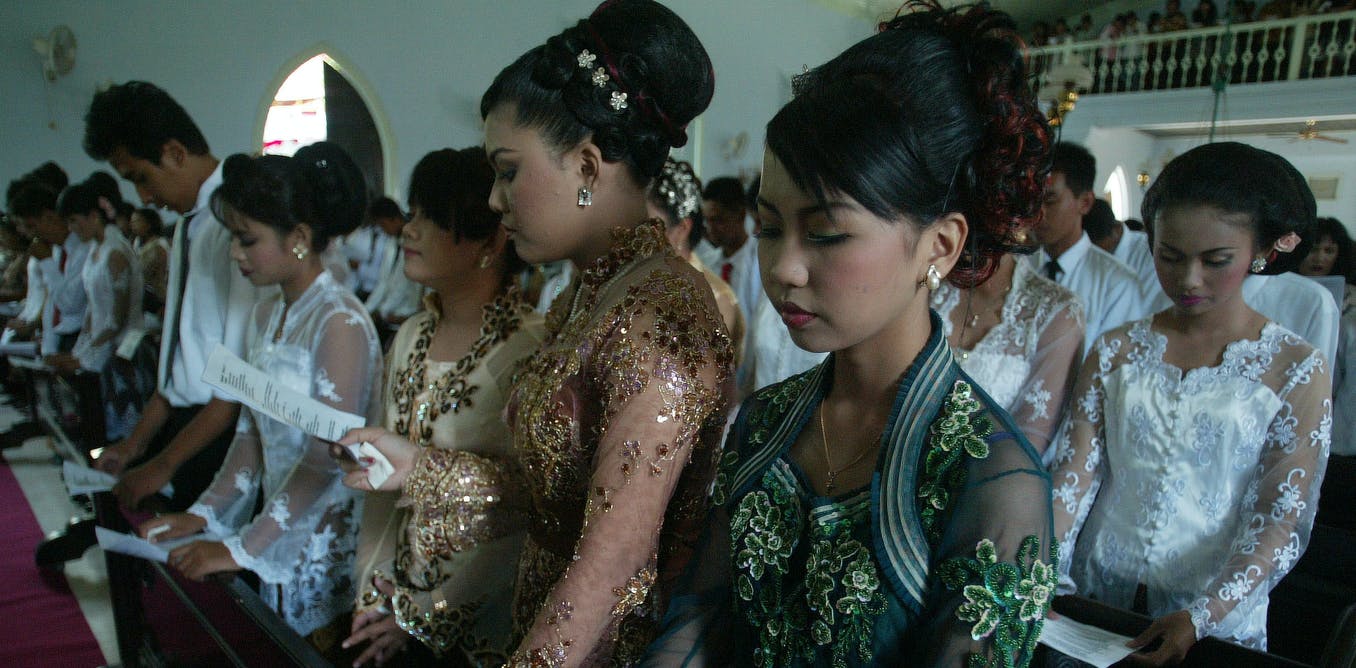Performing faith: more young Indonesian Christians play traditional music to express their religious identity

This article is published to commemorate World Music Day on June 21.
Music forms an important sphere of social and cultural life; it sustains communities and contributes to social integration. It is a creative force in shaping individual and group identity as a means of cultural expression.
In a country where Christians are a minority, understanding how religious groups use traditional arts and music to convey their faith and identity is important to preserve their cultural legacy.
I study traditional Indonesian music genres, including their usage in Christian contexts – both Protestant and Catholic – particularly in the central part of Java and the island of Flores, in eastern Indonesia. I observed and participated in numerous religious musical events, including religious services, weddings and radio broadcasts.
This study is outlined in my 2020 book, Performing Faith: Christian Music, Identity and Inculturation in Indonesia.
In the book, I observed a generational divide among Indonesian Christians. This was evident from their differing musical tastes: religious music that uses traditional mediums and language is generally favoured by middle-aged and older generations.
However, thanks to traditional music departments at national art schools throughout Indonesia, a significant number of young people, including Christians, incorporate traditional arts in their religious expressions.
A marriage of local tradition and global faith
In my studies, I analysed traditional forms of Christian music – including traditional dances and shadow puppet theatre that were popular among older Christians. This was in sharp contrast to their younger peers, who preferred modern renditions of church songs.
A shadow puppet production with traditional gamelan music, dubbed “Wayang Wahyu”, by the Indonesian Institute of Arts-Surakarta, tells the story of Moses.
This situation is largely the result of globalisation, in addition to Indonesian national politics that has consistently stressed the need for modernisation, progress and development.
The image of traditional arts as “backward”, “old-fashioned” and needing “improvement”, strongly messaged by the authoritarian New Order government (1966-98), contributed to the fact that young people, particularly in urban areas, often reject indigenous traditions and seek integration with “modern” national culture.
Some of these differences can be observed between Christian youth living in towns and villages, with the latter showing a greater interest in traditional music.
However, the picture is not as bleak as it seems. As traditional music faculties and schools have sprung up across the nation, more and more young people are studying traditional arts – an option that used to be limited to courts and elites.
In Java, many Catholic and Protestant communities welcome traditional music in worship services, especially within the Javanese Christian Church (Gereja Kristen Jawa, or GKJ).
Religious songs composed with Javanese gamelan are performed by young choir members with or without the traditional instruments.
As traditional arts compete for their share of the national art market, they also strive to secure a place in the life of the Indonesian Church.
In the 21st century, traditional arts are already present in Indonesian churches. However, Christian communities still need to nurture these art forms to broaden its audience, especially among youth.
Educating children and young people to understand and appreciate traditional culture as a whole, is one of the ways to ensure the sustainability of traditional music heritage.
Outside interest in traditional music – including by both foreign researchers and Indonesians researching local traditions other than their own – frequently generates amazement among local communities. Such interest highlights the value of traditional music, which may eventually increase the appreciation for it.
A foremost Catholic institution in Yogyakarta, the Center for Liturgical Music (Pusat Musik Liturgi, or PML), organises music workshops throughout the country. Their overall purpose is to induce and stimulate the development of regional religious music, especially songs, that draw on rich local traditions.
Karl Edmund Prier, a German priest in Indonesia who became one of PML’s leaders, emphasises that some young people who participated in these workshops became very enthusiastic about their heritage. Young Christians subsequently started learning about their own musical cultures.
Karl Edmund Prier, one of the leaders of Pusat Musik Liturgi Yogyakarta, on the use of traditional music in Indonesian churches.
In my work as a professor and active musician, I also see young students from Indonesia coming to Poland for their studies. Through the Indonesian Embassy, some of them become interested in traditional Indonesian music played on gamelan and at times on other instruments. They often join in learning and subsequently in performing for various cultural occasions in Warsaw and beyond.
Through plurality of music genres (not only traditional), Indonesian Christians – similar to their Muslim counterparts – learn how to be Christian within an Asian and Southeast Asian context, how to relate to Euro-American Christianity, and how to actively shape Indonesian Christianity.
By means of music performance, Indonesian Christians are making diverse statements about history, power, and cultural and social alliances, while continuously exploring their own communal and individual identities.
Marzanna Poplawska does not work for, consult, own shares in or receive funding from any company or organization that would benefit from this article, and has disclosed no relevant affiliations beyond their academic appointment.







